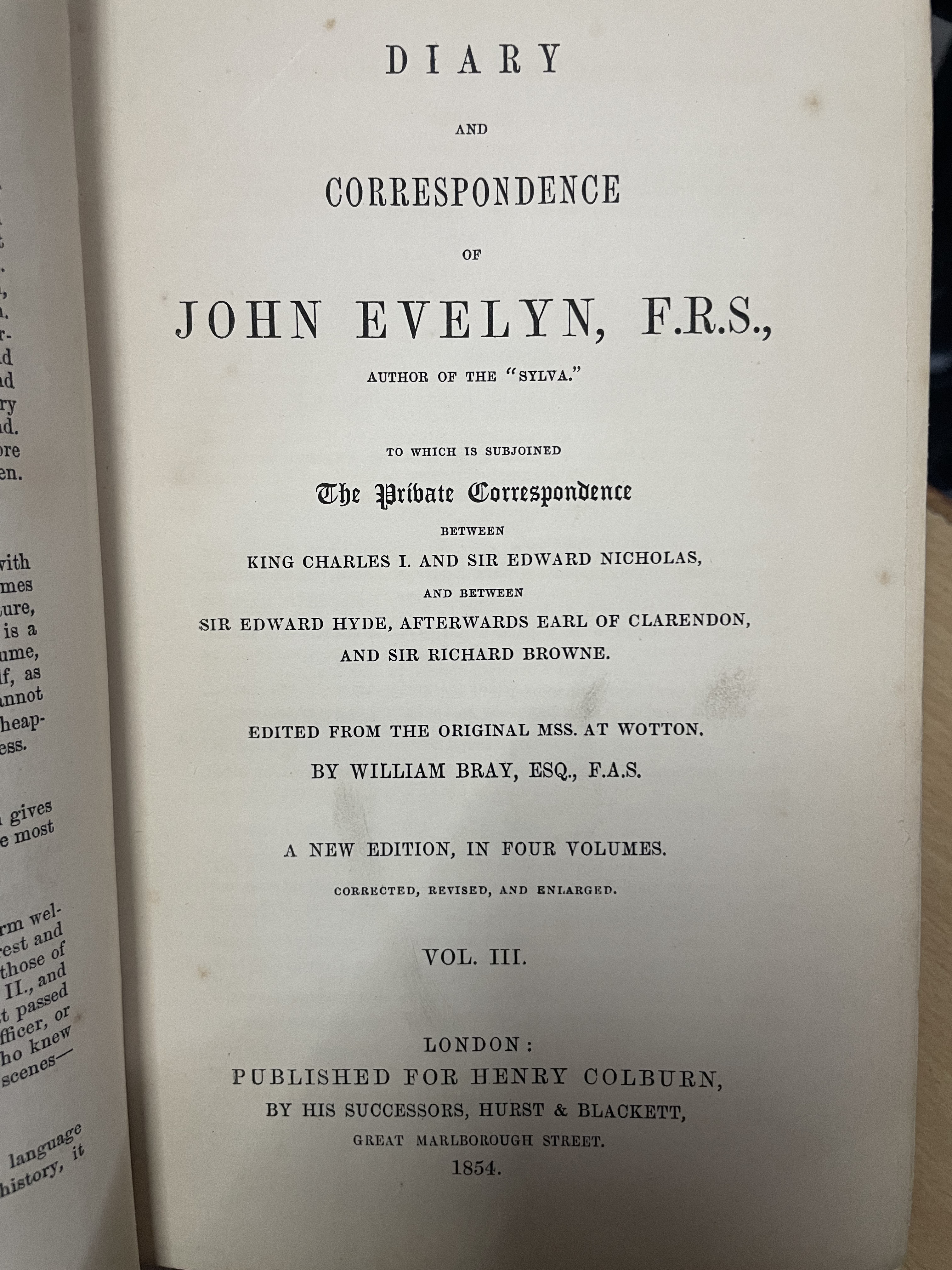The diary and Correspondence of John Evelyn vol III

About
Summary
Exquisite
TOC
Details
Related
URL
Images
Overview
John Evelyn (1620–1706) was an English writer, gardener, courtier, and government official, best known for his diary, which provides insight into 17th-century life. William Bray edited and published Evelyn's Diary and Correspondence in 1818. The diary spans Evelyn's adult life from 1640 to 1706 and covers art, culture, and politics, including the execution of Charles I, the rise and death of Oliver Cromwell, the Great Plague of London, and the Great Fire of London.Evelyn's diary is a primary source for understanding 17th-century English life and manners. It contains descriptions of places and events, character sketches, and reports of sermons, offering a comprehensive view of the period from 1631 to 1706. Evelyn's diary is largely contemporaneous with that of Samuel Pepys, another noted diarist of the time. Unlike Pepys, who wrote for himself, Evelyn seemed to intend his diary for publication, presenting a more curated account of his life.
Importance of Book
Evelyn's diary is an invaluable historical resource for several reasons:
Eyewitness Account: The diary provides a firsthand account of significant events and developments in 17th-century England. Evelyn's observations offer a unique perspective on the political, social, and cultural landscape of the time.
Detailed Descriptions: Evelyn's diary is known for its detailed descriptions of places, people, and events4. His meticulous record-keeping provides a wealth of information for historians and researchers.
Cultural Insights: The diary offers insights into the values, beliefs, and attitudes of 17th-century English society. Evelyn's writings reflect the concerns and priorities of his time, providing a window into the cultural mindset of the era.
Key Themes
Art, Culture, and Politics: Evelyn's diary covers a wide range of topics, providing insights into the artistic, cultural, and political developments of his time. He witnessed major events, such as the execution of Charles I and the Great Fire of London, and recorded his observations and reflections.
Social and Religious Life: The diary sheds light on the social customs, religious beliefs, and daily routines of 17th-century England. Evelyn's entries offer glimpses into the lives of both ordinary people and prominent figures, providing a rich tapestry of the era.
Personal Reflections: While Evelyn's diary is less intimate than Pepys', it still contains personal reflections and insights into his thoughts and feelings. He wrote about his family, his health, and his spiritual concerns, revealing aspects of his inner life.
Cultural Significance
The cultural significance of The Diary of John Evelyn lies in its contribution to our understanding of 17th-century England. The diary offers a detailed portrait of a society undergoing significant change, shaped by political upheaval, religious conflict, and intellectual ferment. Evelyn's writings reflect the values and concerns of his time, providing insights into the cultural landscape of the era.
Effects on Society
It is difficult to measure the precise effect that The Diary of John Evelyn had on the country and society. However, the diary's publication in 1818 helped to shape historical understanding and cultural memory. By providing a detailed account of 17th-century England, Evelyn's diary has contributed to our knowledge of the past and helped to inform contemporary perspectives on history and culture.
Title
The diary and Correspondence of John Evelyn vol III
Author
William Bray
Name of Publisher
Henry Colburn London
Publish Date
1854
Subject
a comprehensive collection of the diaries and letters of John Evelyn, a prominent English writer, gardener, and diarist of the 17th century. The work is typically published in multiple volumes, and th
Vintage
1801-1900
Category
Literary
Sub Category
Biography
Rarity
RARE
